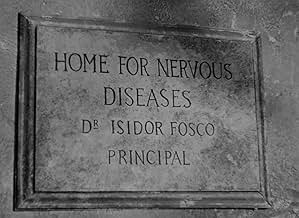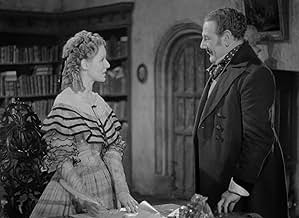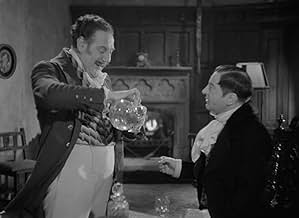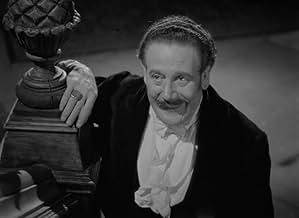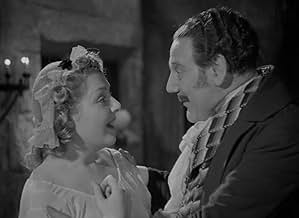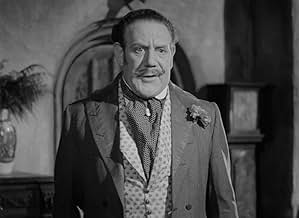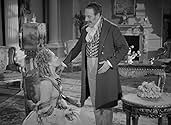VALUTAZIONE IMDb
6,2/10
666
LA TUA VALUTAZIONE
Aggiungi una trama nella tua linguaA madman kills a man who has just inherited a large estate, then impersonates his victim to gain entrance to the estate so he can murder his enemies.A madman kills a man who has just inherited a large estate, then impersonates his victim to gain entrance to the estate so he can murder his enemies.A madman kills a man who has just inherited a large estate, then impersonates his victim to gain entrance to the estate so he can murder his enemies.
- Regia
- Sceneggiatura
- Star
Grace Arnold
- Maid
- (non citato nei titoli originali)
Vincent Holman
- Asylum Doctor
- (non citato nei titoli originali)
Recensioni in evidenza
The Woman in White, a great novel penned by Wilkie Collins, serves as the backbone for this Reader's Digest version of the novel adapted by Edward Dryhurst and produced/directed by Tod Slaughter regular George King. Slaughter also served as a producer, and this films has higher production values than most of Slaughter/King's previous efforts. While I enjoy the movie vastly, I am hesitant to call it the best of Slaughter's work. Give me The Face at the Window or even better Murder in the Red Barn where Slaughter leers more in one movie than twelve men could in twelve movies! Notwithstanding that this film is quite good as Slaughter opens the film drilling a nail/spike into a sleeping man's head in the Australian outback and assumes his identity going to England as the new lord of the manor. Slaughter immediately takes note of the young blonde maid who he raise up to chambermaid. With Slaughter's eyes rolling, his heavy-handed gesturing, and his tone and inflection, you know exactly what his intentions are at every moment. I know of no other actor who acts this way and could get away with acting this way. Slaughter does it so effortlessly, and let's be honest - if you are watching this film it is more than likely to see him. He is larger than life. The thickest slice of ham I have ever seen in films. The adaptation of Collin's novel has many shortcomings but stays surprisingly faithful to the main parts. The direction of King is adequate and the other performers are really rather good. Slaughter dispatches of people with glee and has some wonderful scenes with Hay Petrie as Isidor Fosco - a scoundrel of a different stripe so to say. Leering, drowning, hackling maniacally all are part of the Tod Slaughter package here. If you still have not seen one of his films, this one is as good as any to begin seeing what all the fuss - deserved and still not completed in any way - is about regarding Tod Slaughter.
Tod Slaughter. 60 years ago he dominated British B movies, 30 years ago no one remembered him, to-day he is being re-discovered and given the respect he has always deserved. Welcome back Tod! Modern film historians compare him to Boris Karloff and while that is a nice accolade it is not entirely appropriate. If we have to compare Tod to another British screen villain I would choose Lionel Atwill. Oh yes, Boris could be menacingly evil but there was always a motivating force behind him, a drive that so obsessed him he lost sight of everything else (check out THE DEVIL COMMANDS or THE MAN WITH NINE LIVES or even BEFORE I HANG to see what I mean.) Lionel and Tod were evil for no other reason than they simply WANTED to be; they were mean and they liked it!
That having been said now lets discuss this movie. You know you are in for a great time when the picture has only just begun and a killer strikes by hammering a wooden spike into the ear of a sleeping man! That killer is our Tod (what a surprise!) and he impersonates the dead man, Sir Percival Glyde, to take possession of a large inheritance. Trouble rises when Tod discovers he has inherited nothing but a big stack of bills and if he wants to avoid Debtor's Prison he'd better find a rich wife right away! Is that a problem? Not for Tod, he has set his sights on a lovely young maiden in a nearby estate. So what if she is young enough to be his daughter she is rich and who knows, she just might have an . . .er . . . "accident" not long after the wedding.
This is melodrama at its best. The false Sir Percival is hardly inside his manor house before he begins canoodling with a buxom chambermaid. When she informs him that she is expecting his child he leads the gullible girl to the boat dock where he strangles her ("You wanted to be a bride? I'll make you one! A bride of Death! Heh, heh heh!") Meanwhile there is another woman hanging around who claims that Sir Percival is already married . . . to her, and they have a daughter! Honestly stealing a fortune is such a very complicated thing! Tod has to find a way to eliminate them too. Does he? You will find out.
Part of the fun of watching a Tod Slaughter film is seeing just how perversely evil he can be and knowing that at the end his fate will be a fitting one; this movie does not disappoint on any level.
Is this his best film? Some people say so; though my personal favourite is THE FACE AT THE WINDOW. Now sit back, imagine yourself in a British theatre back in the Victorian days and enjoy the show. Feel free to hiss the villain and cheer the hero and heroine. Enjoy!
That having been said now lets discuss this movie. You know you are in for a great time when the picture has only just begun and a killer strikes by hammering a wooden spike into the ear of a sleeping man! That killer is our Tod (what a surprise!) and he impersonates the dead man, Sir Percival Glyde, to take possession of a large inheritance. Trouble rises when Tod discovers he has inherited nothing but a big stack of bills and if he wants to avoid Debtor's Prison he'd better find a rich wife right away! Is that a problem? Not for Tod, he has set his sights on a lovely young maiden in a nearby estate. So what if she is young enough to be his daughter she is rich and who knows, she just might have an . . .er . . . "accident" not long after the wedding.
This is melodrama at its best. The false Sir Percival is hardly inside his manor house before he begins canoodling with a buxom chambermaid. When she informs him that she is expecting his child he leads the gullible girl to the boat dock where he strangles her ("You wanted to be a bride? I'll make you one! A bride of Death! Heh, heh heh!") Meanwhile there is another woman hanging around who claims that Sir Percival is already married . . . to her, and they have a daughter! Honestly stealing a fortune is such a very complicated thing! Tod has to find a way to eliminate them too. Does he? You will find out.
Part of the fun of watching a Tod Slaughter film is seeing just how perversely evil he can be and knowing that at the end his fate will be a fitting one; this movie does not disappoint on any level.
Is this his best film? Some people say so; though my personal favourite is THE FACE AT THE WINDOW. Now sit back, imagine yourself in a British theatre back in the Victorian days and enjoy the show. Feel free to hiss the villain and cheer the hero and heroine. Enjoy!
I have to admit to having never seen a Tod Slaughter movie. What a great screen presence. What an absolute cad. He is the consummate conniver and master of perversity. He kills a man in Australia and takes over his identity. He becomes the Lord of the Manor and runs the household on his own rancid terms. He gets a servant girl pregnant. He marries a local landowner's daughter and does anything to get his hands on the money available to him. There are some wonderful performances, especially that of Hay Petrie, the great sniveling character actor. He consorts with Slaughter with hopes of getting some of the money himself. There are convenient murders and acts of desperation. Through it all, Slaughter laughs at the suffering of others. There is only one person in his world.
Now you could never describe Tod Slaughter as versatile, but as a pantomime baddie-cum-cad, you'll struggle to find someone better. Sure, his style of acting probably did lend itself better to silent films, but in this rather enjoyable drama he comes across quite mischievously. We start when he kills the real "Sir Percival" in the far-flung Australian gold fields then returns to claim his family fortune. Snag? Well what he actually inherits is £15,000 worth of debt. A massive sum at the time and so an advantageous marriage is required. Up steps "Laurie" (Sylvia Marriott). Long promised to "Sir Percival", she agrees to obey her father and go through with the marriage. Now there is a fly in the ointment for our impersonator, here. Virtually nobody remembers him after his twenty year absence except one woman who claims he fathered a child with her before he left. He denies it, as does she - but that's because she calls him out. That intrigues the local keeper of the sanatorium "Dr. Fosco" (Hay Petrie) who sees an opportunity to line his own pockets. None of this bodes well for "Laurie". Can her sister "Marian" (Hilary Eaves) and friend "Paul" (Geoffrey Wardwell) manage to save her from her increasingly lecherous, murderous, husband and his venal cohort? The poster describes this as ideal for midnight theatre on a Friday night and that's about right. There's not much jeopardy, but Slaughter overdoes it nicely as he hams up his performance towards the denouement that I was slightly disappointed with. Still, I don't suppose the baddie can ever win.... Fun, this - worth a watch.
It seems surprising - not knowing the copyright situation with Wilkie Collins original - that a quota quickie producer like George King should be able to get his hands on a respected literary source like THE WOMAN IN WHITE. However, the script rewrites the story so it is entirely told from the viewpoint of the false Sir Percival Glyde. Other adaptations might tell the tale from the viewpoint of the heroines as they struggle to unravel the mystery - but we are aware of the deception from the start as Tod creeps into a sleeping gold prospectors tent and dispatches him in a manner that suggests he's read Hamlet.
The disadvantage of this approach is that the fascinating, complex characters of Collins' text are flattened to one-dimensional cyphers. Laura is as much of a shrinking violet as she is in the novel but the fascinating figure of Marion (sapphic hints well suppressed here) is sidelined for much of the time. The annoyingly-hypochondriac Mr Fairlie seems more robust and more of a stock-comic figure. But the reduction of the fascinating figure of Count Fosco to Glyde's stooge is the most grievous oversight. Fosco - a roly-poly lovable eccentric who liked dogs and sunlight - was all the more chilling for being above suspicion unlike the obviously-villainous Glyde. For all that Hay Petrie brings to the part, it's just a shadow of what it could be. Still, Petrie and Slaughter make a fine pair of rogues - a cut-rate British version of Sidney Greenstreet and Peter Lorre.
What do we get in compensation for this? Two words - Tod Slaughter. His films are unique in that we get to view the story from the villain's perspective - imagine James Bond from Blofeld's viewpoint. He rises to the occasion here and is at his most lecherous - fixing his beady eyes on a comely maid whom he assigns "special duties", then strangles when she becomes inconveniently pregnant, gleefully snogging Laura upon first meeting her, and finally trying his evil way on her sister at the climax saying "I used to break precipitous horses in the Australian gold fields, and I'll enjoy breaking you!" Seldom has any villain cackled so evilly as Tod does here. Tod may start the film in an understated fashion as "Sir Percival" comes home but he's soon giving us the full melodramatic range - shifty up-to-no-good expression, comic exasperation as the bills pile up, and unashamed lechery as - convincingly sloshed on his wedding night - he ominously mounts the stairs as his squeamish bride waits fearfully in her bed. Incredibly, he is allowed to have his "wicked way" with her. Further examples of unbridled villainy include opening the window in the bedroom of the pneumonia-ridden Woman in White - having announced he expects a "change in her condition" - and luring one victim to her death saying she will, shortly, "be going on a long journey". Freddy Krueger could do with Tod's gag writers.
Something just occurred to me. We never discover the true identity of Tod's character. But examine the facts. A boozy, lecherous, overweight rogue from Australia who abuses a position of social authority and whose very repellent physical presence doesn't dampen his sex-drive for the ladies - was he Sir Les Patterson?
The disadvantage of this approach is that the fascinating, complex characters of Collins' text are flattened to one-dimensional cyphers. Laura is as much of a shrinking violet as she is in the novel but the fascinating figure of Marion (sapphic hints well suppressed here) is sidelined for much of the time. The annoyingly-hypochondriac Mr Fairlie seems more robust and more of a stock-comic figure. But the reduction of the fascinating figure of Count Fosco to Glyde's stooge is the most grievous oversight. Fosco - a roly-poly lovable eccentric who liked dogs and sunlight - was all the more chilling for being above suspicion unlike the obviously-villainous Glyde. For all that Hay Petrie brings to the part, it's just a shadow of what it could be. Still, Petrie and Slaughter make a fine pair of rogues - a cut-rate British version of Sidney Greenstreet and Peter Lorre.
What do we get in compensation for this? Two words - Tod Slaughter. His films are unique in that we get to view the story from the villain's perspective - imagine James Bond from Blofeld's viewpoint. He rises to the occasion here and is at his most lecherous - fixing his beady eyes on a comely maid whom he assigns "special duties", then strangles when she becomes inconveniently pregnant, gleefully snogging Laura upon first meeting her, and finally trying his evil way on her sister at the climax saying "I used to break precipitous horses in the Australian gold fields, and I'll enjoy breaking you!" Seldom has any villain cackled so evilly as Tod does here. Tod may start the film in an understated fashion as "Sir Percival" comes home but he's soon giving us the full melodramatic range - shifty up-to-no-good expression, comic exasperation as the bills pile up, and unashamed lechery as - convincingly sloshed on his wedding night - he ominously mounts the stairs as his squeamish bride waits fearfully in her bed. Incredibly, he is allowed to have his "wicked way" with her. Further examples of unbridled villainy include opening the window in the bedroom of the pneumonia-ridden Woman in White - having announced he expects a "change in her condition" - and luring one victim to her death saying she will, shortly, "be going on a long journey". Freddy Krueger could do with Tod's gag writers.
Something just occurred to me. We never discover the true identity of Tod's character. But examine the facts. A boozy, lecherous, overweight rogue from Australia who abuses a position of social authority and whose very repellent physical presence doesn't dampen his sex-drive for the ladies - was he Sir Les Patterson?
Lo sapevi?
- QuizVery loosely based on the 1859 novel "The Woman in White" by Wilkie Collins.
- BlooperWhen Marian Fairlie sneezes, Sir Frederick Fairlie complains about her spreading germs. But the story is set in the 1850s, and the germ theory of disease would not be known to the public until the 1870s.
- Citazioni
The False Percival Glyde: [after tying a noose around his victim's neck] You always said, you were a teetotaler. You're going to have a nice drop, now!
I più visti
Accedi per valutare e creare un elenco di titoli salvati per ottenere consigli personalizzati
- How long is Crimes at the Dark House?Powered by Alexa
Dettagli
- Data di uscita
- Paese di origine
- Lingua
- Celebre anche come
- Crimes at the Dark House
- Azienda produttrice
- Vedi altri crediti dell’azienda su IMDbPro
- Tempo di esecuzione
- 1h 9min(69 min)
- Colore
- Proporzioni
- 1.37 : 1
Contribuisci a questa pagina
Suggerisci una modifica o aggiungi i contenuti mancanti

